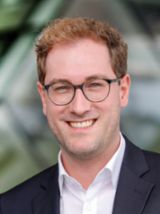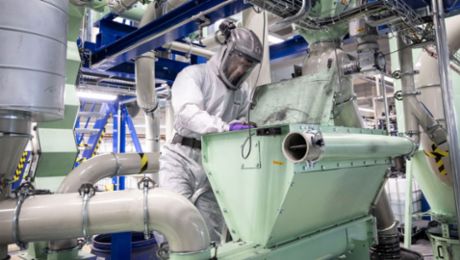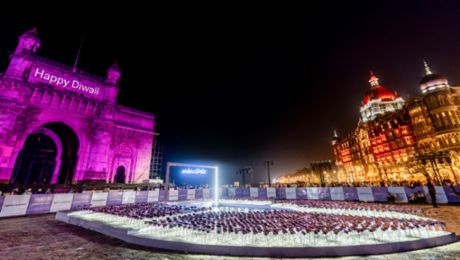Carla, what motivates you to act and live responsibly – and how do you apply that to your professional work?
Carla Römisch: I am firmly convinced that we as a society have a responsibility for our actions and our environment – especially in a world with finite resources and increasing global challenges such as climate change and social inequality. My professional path reflects this personal commitment: I first gained experience at Porsche in materials engineering, a field dedicated to the selection, development, and testing of materials. Even then, my focus was on resource-efficient materials. I then deepened my knowledge in the field of electromobility at a technology consulting company. Back at Porsche, I developed a method for the early prediction of CO₂ emissions in the supply chain. Today, I work in pre-development of vehicles, striving to drive forward sustainable product development and deliver innovative technical solutions for our customers.
"Pre-development is the creative ideas workshop where the future of our products begins to take shape. "
What does vehicle pre-development actually involve, and what kind of processes are initiated during this early phase?
Römisch: Pre-development at Porsche is the creative ideas workshop where the future of our products begins to take shape. Before a new vehicle enters series development, innovative technologies and trends are identified early on and transformed into well-thought-out, future-proof concepts. We build initial prototypes, test materials, and evaluate both the technical and economic feasibility of these concepts. In doing so, we work closely with many departments – from research and sustainability strategy to production, design, and sales. Collaboration with external partners, such as universities or direct suppliers, is also important to us in order to incorporate fresh ideas and specialized expertise. In body pre-development in particular, we rely on interdisciplinary teams working on future-oriented topics such as lightweight construction, aerodynamics, interior experience, and safety.
What role does sustainability play in your daily work?
Römisch: Pre-development can lay the foundation for sustainable innovations – it’s where the first steps are taken and the course is set for products with reduced environmental impact. At this early stage of the development process, many decisions are still open – giving us the flexibility to consider resource-efficient concepts from the very beginning. Whether it’s about material selection, new technologies, or product design: the earlier ecological and economic aspects are taken into account, the more effective and cost-efficient their implementation can be later on. Early consideration of sustainability requirements also helps to meet legal regulations and environmental standards. Integrating sustainability aspects into vehicle development processes from the outset is therefore not only an ecological necessity, but also a strategic imperative to develop future-ready and competitive products. Our goal is to systematically and holistically incorporate sustainable solutions already in the pre-development phase.
"The earlier ecological aspects are taken into account, the more effective their implementation can be."
How does this work in practice?
Römisch: We pursue what we call a "Holistic Eco Concept" – our approach to sustainability with a focus on plastics used in both the vehicle interior and exterior. We consider the entire life cycle of the vehicle – from development and production to the use phase and end of life. In close collaboration with colleagues – including those from materials engineering – we analyze each component in detail: from the plastic substrate to lamination layers and visible surfaces. In doing so, we identify potential for CO₂ reduction as well as the use of recyclates and renewable raw materials. Through material and component testing as well as prototype builds, we also examine potential trade-offs with requirements such as weight or cost. Our goal is to comprehensively assess and further develop resource-efficient material concepts with CO₂ reduction potential.
Could you give an example of such a material?
Römisch: When using renewable raw materials, we place particular emphasis on regional sourcing and resource efficiency. We are especially interested in materials that are by-products and have so far seen little use in our vehicles – such as wool from regional landscape sheep. Landscape sheep are specifically used for the maintenance and preservation of cultural landscapes. Through their grazing, they play a key role in maintaining a diverse vegetation structure, helping to suppress dominant plant species and creating habitats for many other species. At the same time, they provide a renewable raw material that has largely gone unused. In northern Germany alone, around 2,000 tons of such wool are produced each year, with very little demand. That’s why we are exploring the potential of using this wool – both for textile surfaces and as acoustic insulation material.
Can recycling also play a role in the early stages of vehicle development?
Römisch: Recycling is a central element of our circular economy approach and an important lever for improving resource efficiency at Porsche. We work closely with our colleagues from the sustainability strategy team. In pre-development, my focus is particularly on the recycling of plastics. Our goal is to select materials and design components in such a way that, at the end of their life cycle, they can be recycled with high quality and ideally reused in a closed material loop – for example, by turning an old bumper into a new component. We do not rely on a single technology but consider mechanical, physical, and chemical recycling. The choice of method depends on the required material properties as well as the component’s specifications.
Circular economy: Recycling is a central element
What are your personal highlights in your daily work? What motivates and moves you?
Römisch: In my work in pre-development, I am particularly motivated by the creative freedom that allows me to bring dynamism and variety to my tasks: no day is like the other, and the changing challenges constantly require me to think flexibly and develop new solutions. Additionally, I am motivated by working in a dedicated team that passionately pursues common goals and aims to make a positive contribution to the future of our vehicles. Overall, this combination of creativity, team spirit, variety, and a focus on sustainability makes my work very fulfilling and gives me new motivation every day.
A look into the future: How do you assess the future development of sustainability in vehicle pre-development? Where do you see trends emerging? What plans do you have for the future?
Römisch: Trends such as advancing digitalization, especially the use of artificial intelligence and data-driven analytics, enable us to make development processes more precise and efficient — which can significantly promote the creation of products with reduced environmental impact. Additionally, we are expanding the evaluation criteria for components to specifically assess their sustainability. Another important trend is the closer collaboration between manufacturers and recyclers. Only through strong partnerships can new technologies for material separation and processing be developed that improve the quality of recycled materials and effectively implement closed loops. It will be crucial to align the needs of both sides well and establish efficient supply chains. Looking ahead, sustainability in pre-development is no longer just an additional criterion but a great opportunity for increased innovation and competitiveness.
Circular economy at Porsche
Porsche strives for a responsible and resource-conserving use of raw materials as well as a long-lasting utilisation of the vehicles and the materials used in them. As part of its ‘Circular Economy’ sustainability strategy field, Porsche aims to promote the use of more ecologically sustainable materials and recyclable concepts along the value chain of its vehicles. This includes projects such as closed-loop concepts for high-voltage batteries, the use of circular materials, the avoidance of waste and the remanufacturing of vehicle components.
Info
In the interview series "Perspectives on Sustainability", Porsche employees talk about their specialist subject areas. The interview with Carla Römisch is part 17 of the series.


